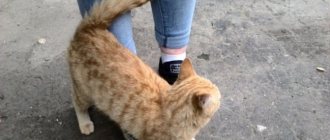Unsociability and outright fear of people on the part of homeless animals are natural and do not cause surprise. This behavior is explained by their difficult fate and the need for constant survival in harsh conditions.
With domestic cats, who have only recently begun to be afraid of everything, the situation is somewhat more complicated. In such situations, it is very important to find out the cause of the anxiety and try to eliminate it - otherwise you risk becoming the owner of a nervous and aggressive pet.
Why did the animal suddenly become afraid of everything?
The main reasons for sudden changes in behavior include nervous shocks and various pathologies affecting the central nervous system. In the first case, the problem is solved by creating a safe and comfortable environment, and in the second, by drug treatment under the supervision of a veterinarian.
Negative memories
If you got your pet from other owners or were picked up on the street, then you can only guess about its past. If there are negative memories of a certain event, fear will be activated by a specific trigger: children, dogs, a wave of the hand, or seemingly harmless things.
Initially, a domestic cat may be frightened by shouting too loudly, unfair punishment, or accidentally stepping on its tail or paw. Despite the absence of malicious intent on your part, such events must be smoothed out. Otherwise, the animal will begin to avoid you and hide in secluded places.
IMPORTANT!
Don't let your pet go out alone if you can't guarantee its safety.
Experienced stress
Most mustachioed pets are terrible conservatives. Any change in their usual lifestyle puts them in a state of stress. It is especially difficult for cats to move, meet new family members, change owners, and receive treatment.
Stress can be short-term or chronic. In the first case, the animal copes with the experiences on its own after a couple of hours or a day, and in the second, it is in dire need of outside help. Chronic stress is provoked by frequent encounters with irritating factors, as well as prolonged exposure to unfavorable conditions.
Great fright
Another possible reason is severe fear. Cats are sensitive to sharp and loud sounds, so many of them cannot stand a vacuum cleaner, hair dryer and other household appliances.
The effect of surprise plays a significant role. Some owners calm their pets during heat by dipping them in cold water. This method really works, but it also creates a new phobia due to its inadequacy and increases the chances of getting a genital tract infection.
NOTE!
The only humane and really working way to eliminate sexual desire is castration.
Neurological diseases
Mental disorders occur not only in people, but also in their pets. Based on their occurrence, they are divided into congenital and acquired. Sudden attacks of fear and increased anxiety are associated precisely with the latter.
If your pet is over 12 years old or has recently suffered a skull or spinal injury, contact your veterinarian. The resulting deviation may be associated with a stroke or epilepsy. If the pathology is confirmed, the animal will require special care and home treatment.
Poor care
If the owner is used to solving all problems with his fist, then there is nothing surprising in the current situation. The behavior of a purr is difficult to condemn. She is simply forced to demonstrate her strength every day so as not to die. How does the baby know that you are not going to kill her?
In the natural environment, members of a flock are subject to strict selection. At best, weak animals receive scraps and slowly die. They simply don't have a chance to get ahead. If there is a shortage of food or water, the stragglers are disposed of first. This is why it is so important for animals to demonstrate strength.
How to tell if your pet is afraid
All frightened animals behave the same way. Their fear manifests itself through a set of the following external signs:
- pressing the ears to the head;
- fluffing or pinching of the tail between the hind legs;
- arching your back and freezing in place;
- a plaintive meow or a threatening hiss;
- attempts to run away or hide in a dark place;
- compulsive licking;
- change in appetite (refusal to eat or uncontrollable eating);
- relieving yourself past the tray;
- being pulled out of hands when trying to hug;
- sudden jumping up upon direct contact with an irritant.
Much of the above coincides with signs of aggression. This similarity is explained by the fact that the best defense is an attack.
Nervous diseases and disorders in cats
Most often, the owner encounters such disorders in the cat as a nervous breakdown, neurosis, and convulsions.
Teak
Such a phenomenon as a nervous tic (rhythmic twitching of the muscles of the muzzle, fore and hind limbs) is not an independent disease. There are many reasons for its occurrence: from dental problems (twitching of the temporal muscles) to complications after infectious diseases and organic brain lesions.
In neurological practice, nervous tics in domestic cats are rare. The clinical sign requires detailed examination by an experienced neurologist.
Convulsions
Seizures are rare in domestic cats. First of all, the owner should exclude such a severe neurological disease as epilepsy.
The disease is accompanied by clonic-tonic convulsions, the duration and intensity of which depends on the severity of the disease. There is evidence that the tendency to epilepsy is due to genetic predisposition. The use of anticonvulsants helps prevent seizures.
Convulsions and seizures are characteristic of neuroses, neuropathies of various origins and neurological disorders. Only a veterinarian can determine the exact cause and exclude organic pathologies (poisoning, infectious diseases, brain injuries, etc.).
Neurosis
Depletion of the body's nervous system under the influence of a strong or prolonged external stress factor leads to the development of neurosis in pets. At the same time, the symptoms of a nervous system malfunction can be very diverse - from aggression towards the owner to the development of spontaneous hyperesthesia syndrome.
Most often, the owner encounters the following manifestations of neurosis in a furry couch potato:
- Fear of previously familiar objects, premises, rooms. Often a cat is afraid even of its litter box.
- Pointless movement around the room. A call or a sharp sound does not have any effect on the pet.
- Pathological licking of fur, which lasts for hours.
- Pet hyperactivity or, conversely, a state of complete apathy.
- Fear of touch, inadequate reaction from stroking - hyperesthesia syndrome. The slightest touch to an animal causes a storm of negative emotions and hyperactivity: the cat begins to hiss, run around as if scalded, and scream.
Experienced breeders and veterinarians believe that Oriental cats are more susceptible to the disease than other breeds. Their nervous system is less adapted to the changing external environment and often malfunctions.
Oriental cats
Disruption
There are many reasons for a domestic cat to have a nervous breakdown: from changing furniture to moving to a new place. A mental disorder manifests itself in the form of repetitive actions of an animal. The cat constantly licks itself non-stop, rushes from side to side, meows loudly and constantly.
Stress affects the animal's body, leading to a violation of control over its behavior. Rhythmically repeated actions (licking and pulling out fur, meaningless movement around the room) are aimed at turning off the animal’s consciousness in order to protect the nervous system from overwork.
What should the owner do?
It is important to understand one thing - a defensive cat can seriously injure you and even cripple you. At the moment of immediate fright, it is better to leave her alone, giving her the opportunity to come to her senses. After this, you should start looking for the irritating factor and eliminating it.
Correct behavior of all family members
If you do not live alone, gather a family council. Their effectiveness will depend on the coherence of your actions. How to solve the problem depends on the situation:
- Negative memories.
Surround your pet with attention and care. Over time, he will understand that nothing threatens him in your home.
- Stress.
Choose a more comfortable carrier for visiting the veterinarian or help your kitten adapt to unfamiliar conditions.
- Fright.
Give your pet a private corner where he can hide and be alone. In addition to the house, it can be a high play complex with an observation deck at the very top (an example of a homemade house).
If you suspect an illness, contact your veterinarian immediately. Be sure to list all symptoms detected at your appointment. They will help identify the location and extent of the damage.
Should I give my cat a sedative?
Anti-anxiety medications are effective during moving and other stressful situations that cannot be eliminated. They should only be given as directed by a veterinarian. The only exception is a special diffuser with cat pheromones. It acts directly on the neurons of the brain and is not addictive.
IMPORTANT!
Do not use valerian to calm your cat. Its prolonged use is fraught with behavioral disorders and the development of drug addiction.
What not to do
Animals' fears are most often associated with negative experiences and mistakes made by their owners when raising them. The most common of them include the following:
- Punishment or reward for being scared. Both actions only exacerbate existing fear.
- Refusal to regularly visit the veterinary clinic. Periodic inspections should be routine, not a surprise.
- Too intrusive communication. Fear of people is not always associated with rough treatment. An animal may avoid its owner due to constant compulsion to play against its will.
It is also important to note that pets should never be intentionally frightened. Such actions may lead to loss of trust.
Strangers
When meeting another person for the first time, we may have the opportunity to figure out whether the stranger is a threat; there are some signs that can make us wary. Cats are a much smaller animal than humans and therefore have some reason to be afraid of new people. They become attached to and trust their human family because they know that we will provide them with food, water, shelter, care and, importantly, are unlikely to harm them.
With strangers, many cats won't feel the same confidence. Additionally, some people may seem more intimidating than others. This may be due to body posture, smell, or a number of reasons known only to the cat. Like others on this list of things that scare cats, some are very friendly and will approach strangers without fear.
Taming an initially timid animal
A timid kitten picked up on the street needs time to develop trust in its new owner. Most often, fear of people in “foundlings” is due to two factors: lack of socialization and cruel treatment. In the first case, the baby simply needs time to understand that he will never again have to fight for his life and look for food on his own.
During the adaptation stage, try to create the most comfortable conditions for the new pet and avoid intrusiveness. The easiest way to gain trust is through food, so at first try feeding your kitten directly from your hands or a long-handled spoon.
If the baby has become a victim of evil people, then he will need much more time. The algorithm for building relationships in such a situation is similar. The only difference is that the kitten’s fear is actually justified. For this reason, it is better to avoid punishment, because a too loud voice or incorrectly chosen intonation can nullify all your achievements.
Useful tips
Before purchasing a new pet, you should think about whether he can get along with the pet already living in the house, and also about how, if possible, to make friends between a cat and a cat in the shortest possible time. Since cats of different sexes get used to each other much faster than cats of the same sex, you should not forget that the character of each animal is individual.
Separating pets during mating season will not lead to anything good
Do not forget that both cats and cats are very sensitive creatures who always understand the attitude of their owners towards themselves, be it love or lack thereof. Having felt and sensed everything that the owner experiences in relation to them, pets begin to behave accordingly.
Why is a cat only afraid of strangers?
If the animal does not panic and calmly retreats behind the sofa or to another safe shelter, then the reason for its behavior lies in banal caution. It is completely natural for cats and does not require outside intervention.
If your pet remains scared even after the stranger leaves, then the problem is much deeper. The reasons here are the same as described above. Due to negative memories, a cat may be afraid of people wearing white clothes or smelling strongly of cigarettes.
Fear of strangers is eliminated by reinforcing positive associations. Encourage your guests to give your cat healthy treats and not cuddle her against her will. Over time, she will understand that such meetings are beneficial to her and are not at all dangerous.
Behavior correction
Do we need to change anything at all? Many people think that there is no point in doing anything, just let the cat hide behind the sofa and sit there. If we exclude aggression from the purr, another problem remains - stress. After experiencing a shock, the pet may begin to mark its territory, tear up wallpaper or chew shoes. What happened will have a bad impact on your pet’s health. Now the answer is clear: you need to help the cat! How? Follow a few rules.
1. Train gradually! Try to invite guests once a week. At first, 1 person will be enough.
2. Don't force your cat to meet strangers. Everything must be on a voluntary basis.
3. If it becomes necessary to invite a group of people, take your pet to a separate room and close the doors. This will make her feel safer.
4. Buy an enclosed house for your pet so that he has his own personal territory. No one should disturb him there.
5. Organize either shelves or ladders. The cat must be able to climb up. The ideal option is a special tree with scratching posts.
Signs
Typically, a cat hisses when it is afraid of other animals or people. But traditionally it is believed that in this way she shows aggression, she can even rush and attack.
When an animal makes such sounds, it becomes tense, bends its back, tail, and may press its ears. What does a hissing cat usually look like?
- His fur instantly stops being tousled , it seems that it has turned from smooth to fluffy, voluminous. Visually, the cat even looks larger at such a moment.
- When a cat is angry, his back arches . This pose is a signal that the animal can and will rush at the offender or someone who, in his opinion, poses a danger.
- The ears are flattened for a reason. They talk about distrust of those around them. It is also a kind of protection for the head from injury.
- An expressive look conveys all the emotions of a cat - courage, aggressiveness, determination. Meowing may also be heard along with the hissing, but it does not make the disheveled cat any cuter. On the contrary, the sounds complement the appearance and confirm the readiness to stand up for oneself and even rush at a person.
The owner of the animal, having studied its habits, will be able to figure out when a cat hisses because of a sense of danger, and when because of a feeling of aggression.
Hissing is inherent in this breed
In some cases, a cat hisses because it is inherent in its breed. It is possible that Siamese hiss due to the inherent behavior of this type of temperament. Some active breeds begin to hiss because the physical stress is too much for them. These are Abyssinian, Oriental, Cornish Rex and some others. Some furry breeds (Persians) cannot stand it; sometimes they wash themselves and immediately begin to pet them. And hairless cats (Egyptian breed) - they hiss every minute, because hissing is part of their conversation, and does not necessarily mean aggression.
Causes
There are several reasons why a cat is afraid of strangers. Perhaps she simply did not communicate with anyone else, since the owner is lonely and no one comes to visit him.
Therefore, any appearance of a stranger in the house causes a fit of fear that this “someone” may disrupt their idyll and take away the love and attention of the owner.
Also, the appearance of xenophobia may be based on the pet’s personal experience. It happens that a person, without knowing it, hurts a cat. First he strokes her, lulls her vigilance, and then suddenly grabs her by the skin and lifts her into the air. Often, strangers do this. Fearing the sharp claws of the animal, they come up with various tricks so as not to provoke an attack.
For example, a veterinarian who wants to examine your pet before giving an injection. The cat does not understand that everything is being done only for the good, it experiences a painful sensation and remembers this unpleasant moment with the stranger. Animals have a good memory, and therefore they can treat all strangers with hatred for many months, and maybe years. Every domestic cat wants to be stroked and caressed, and not to be picked up by the scruff of the neck or to have its sides crushed.
Let's look through the eyes of a furry tenant at the harsh reality. Entering the room and looking around, the cat sees many people staring at it. These are cat lovers, and therefore, they like to look at the graceful person. However, from her point of view, this means a moderate, but threat. And when strangers begin to stretch out their huge hands towards you or wave them at their faces, this is regarded as an attack.











